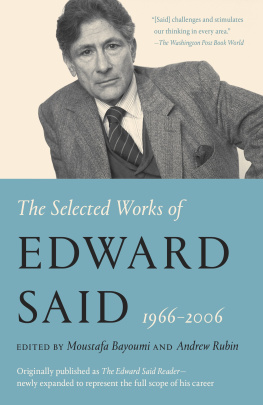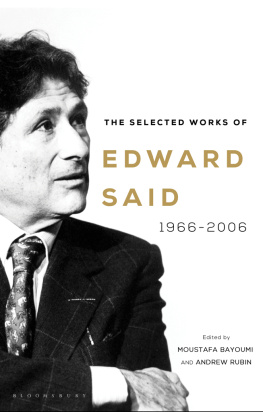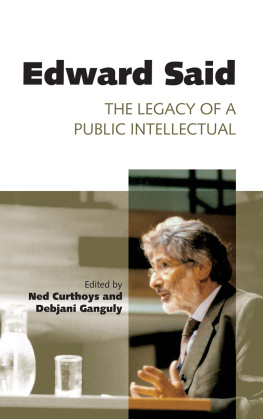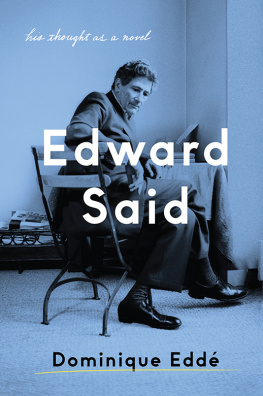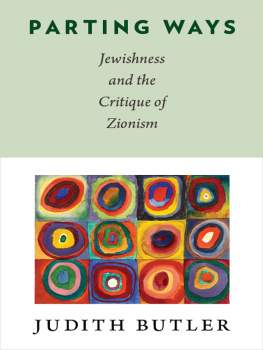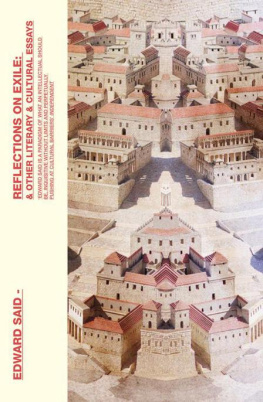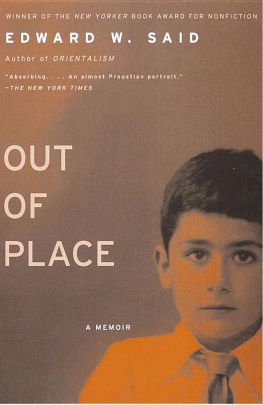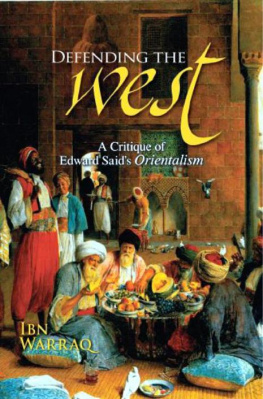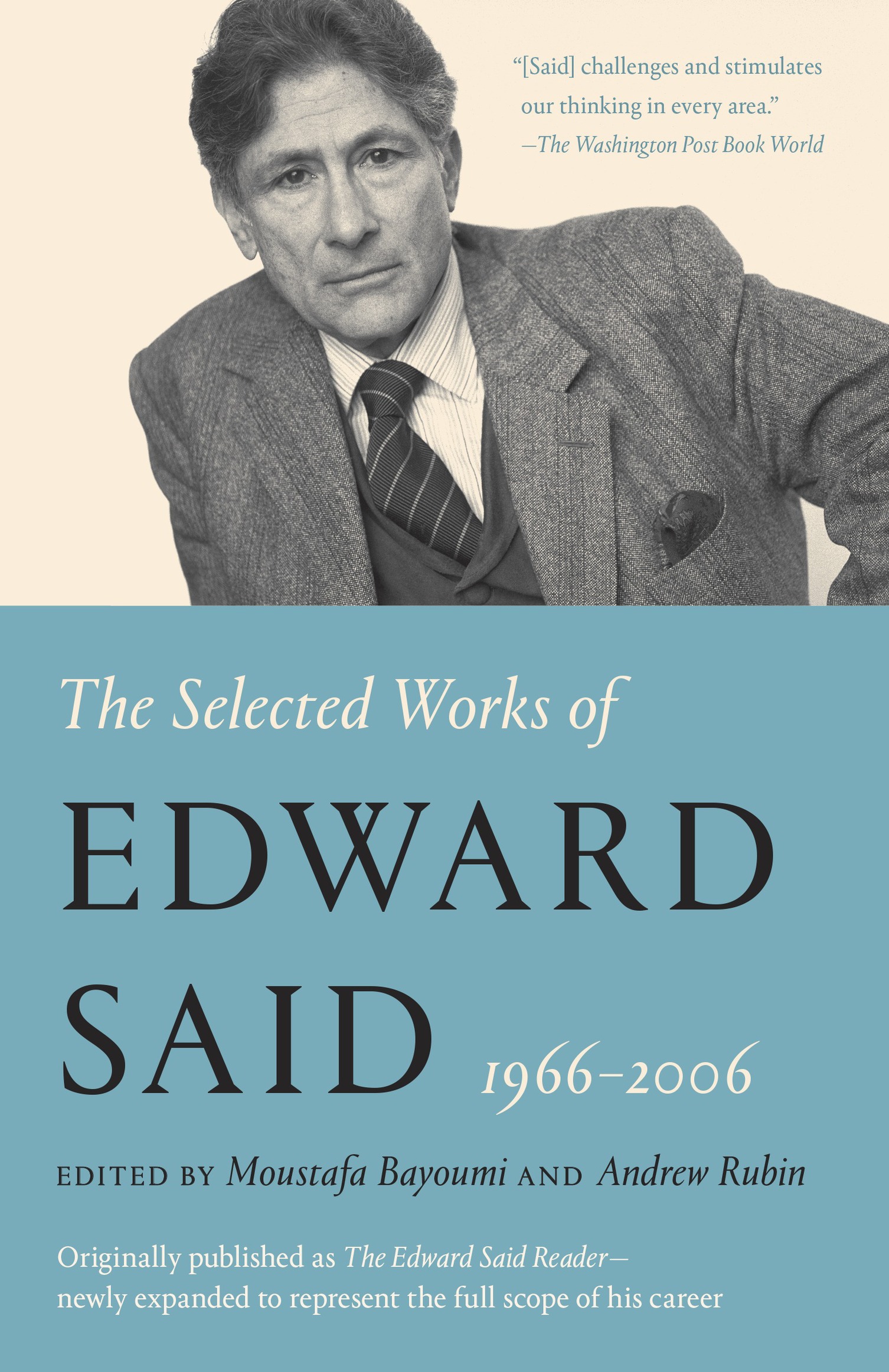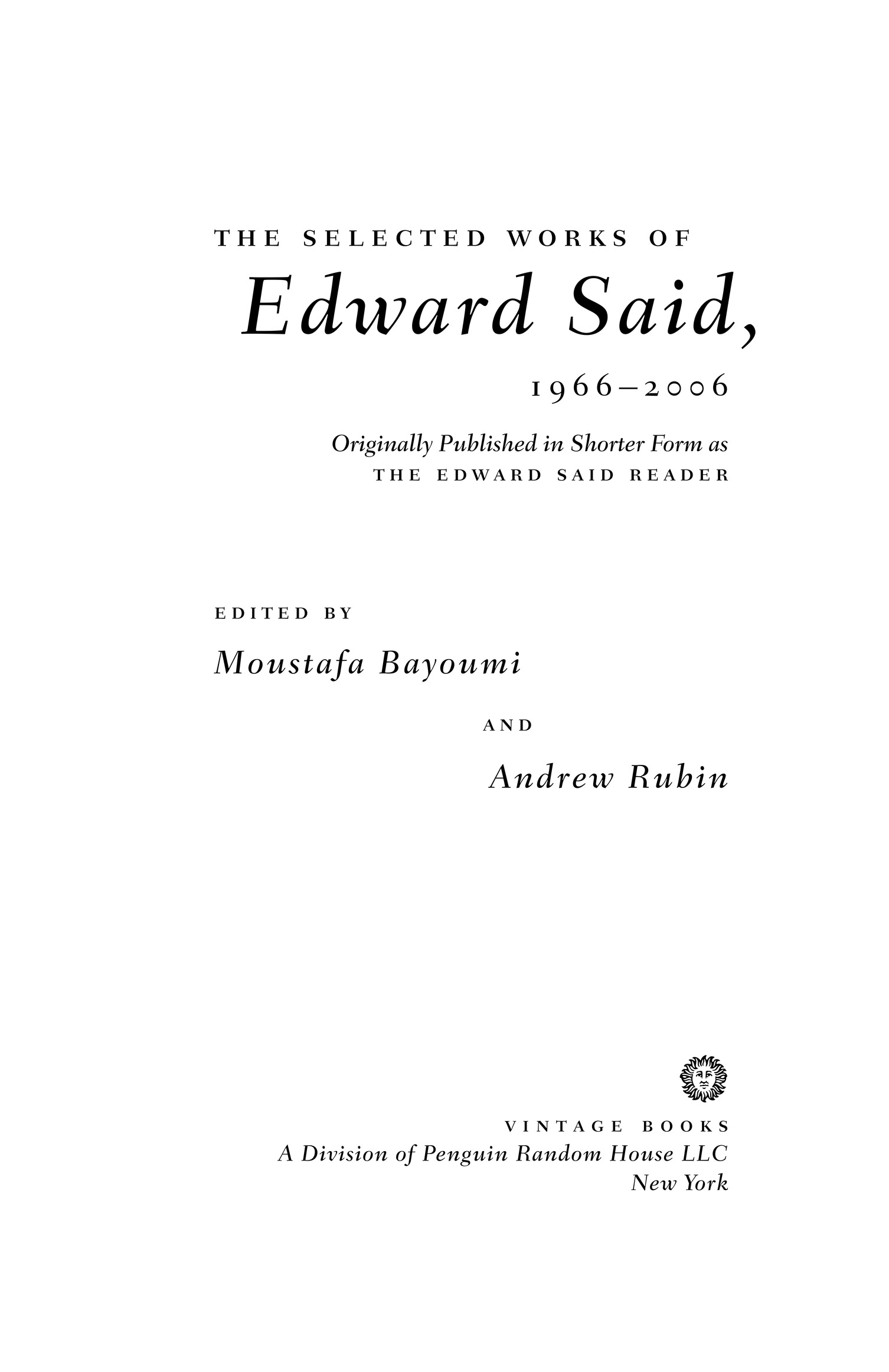Edward W. Said was the author of more than twenty books, including Orientalism, which was nominated for a National Book Critics Circle Award, Culture and Imperialism, and a memoir, Out of Place. He died in 2003.
ALSO BY EDWARD SAID
Joseph Conrad and the Fiction of Autobiography
Beginnings: Intention and Method
Orientalism
The Question of Palestine
Literature and Society (editor)
Covering Islam
The World, the Text, and the Critic
After the Last Sky (with Jean Mohr)
Blaming the Victims
Musical Elaborations
Culture and Imperialism
The Politics of Dispossession
Representations of the Intellectual
Peace and Its Discontents
The Pen and the Sword
Entre guerre et paix
Out of Place
The End of the Peace Process
Reflections on Exile and Other Essays
Parallels and Paradoxes
Freud and the Non-European
From Oslo to Iraq and the Road Map
Humanism and Democratic Criticism
On Late Style
Music at the Limits
SECOND VINTAGE BOOKS EDITION, FEBRUARY 2019
Copyright 2000 , 2019 by Edward W. Said
Preface copyright 2019 by Mariam C. Said
Introduction, headnotes, and bibliography copyright 2000 , 2019 by Moustafa Bayoumi and Andrew Rubin
All rights reserved. Published in the United States by Vintage Books, a division of Penguin Random House LLC, New York, and distributed in Canada by Random House of Canada, a division of Penguin Random House Canada Limited, Toronto. Originally published in paperback as The Edward Said Reader by Vintage Books, a division of Penguin Random House LLC, New York, in 2000.
Vintage and colophon are registered trademarks of Penguin Random House LLC.
constitutes an extension of this copyright page.
Library of Congress Cataloging-in-Publication Data
The selected works of Edward Said, 19662006 / edited by
Moustafa Bayoumi and Andrew Rubin.
New York : Vintage Books, 2000.
I. Bayoumi, Moustafa. II. Rubin, Andrew.
Includes bibliographical references.
Vintage Books Trade Paperback ISBN9780525565314
Ebook ISBN9780307428493
Cover design by Stephanie Ross
Cover photograph Brigitte Lacombe
www.vintagebooks.com
v5.4
ep
ACKNOWLEDGMENTS
The editors wish to thank Dr. Zaineb Istrabadi, Jin Auh, Diana Secker Tesdell, Shelley Wanger, Jacqueline Ko, and, most of all, Mariam C. Said for making this publication possible.
Contents
PREFACE
Humanism is the onlyI would go so far as sayingthe final resistance we have against the inhuman practices and injustices that disfigure human history.
EDWARD W. SAID , Humanism and Democratic Criticism
M y life with Edward Said, a period of almost three and a half decades, flashed before me as I thumbed through the contents of this new edition. I was immediately reminded of the time when he asked me whether I had read Joseph Conrads Heart of Darkness. Edward and I had recently met, and I told him that the only novel of Conrads I had read was LordJim, but he insisted I read Conrads masterpiece. Eventually I did, while I was pregnant with our first son, Wadie. At the time, I was enrolled in Edwards Modern British Literature undergraduate course at Columbia University. The other students did not know that I was pregnant, nor did they know I was Edwards wife. But shortly before the semester came to a close, our first son, Wadie, was born. We were a young family with an intellectual vitality of our own, sustained by Edwards boundless energy and endless knowledge. I felt fortunate to be surrounded by the ideas, discussions, and colleagues who were a vital element in our daily life as a family.
I also remember when, a few months after we married, Edward received a contract from a publisher to write a book. At the time, I had assumed that he would write on the British satirist Jonathan Swift, a writer whom he greatly admired. But to my surprise, Edward chose a completely different subject. That book was Beginnings: Intention and Method. Najla, our daughter, was born a few days before the manuscript went to press, and Edward dedicated Beginnings to the three of us, his family. While I helped Edward prepare the manuscript, Beginnings was also, in a way, a new beginning for Edward, launching his innovations in literary theory and cultural criticism.
Soon after the publication of Beginnings, Edward and Noam Chomsky began discussing coauthoring a book on the Middle East, but the demands on their time did not permit it. The discussions with Noam, however, indirectly led Edward to embark on Orientalism, which he researched and began writing while a fellow at Stanford Universitys Center for Advanced Study in the Behavioral Sciences. As his research assistant, I spent my days at the Stanford University Library browsing the stacks and looking through all the wonderful books. By the fall of 1976, he had written enough material on the book to deliver the Gauss Seminars at Princeton University, based on Orientalism. The audiences reaction was explosive. Edward was criticized, challenged, and, at times, harshly rebuked. But he always looked back on the experience of those seminars as a test that he had passed and one, he added, from which he had learned a lot.
Even that experience could not have prepared us for the public reception of Orientalism, which frankly came as a complete shock. Edward was amazed at the vast number of reviews of the book from across all the disciplines. Reviewers seemed either to celebrate Orientalism or loathe its very existence, with nothing in between. As if overnight, Edward became a world-renowned public intellectual.
Orientalism was deeply connected to Edwards experience of exile as a Palestinian living in the United States. His political engagement with Palestine had been largely shaped by the 1967 War, which we both witnessed separately in New York. Observing Israels shocking defeat of the Palestinians deeply affected us, and it prompted Edward to travel to Jordan, where, before the days of Black September in 1970, he met with many of those directly involved in the liberation struggle. In the United States, he became a critical Palestinian voice in a culture where Palestinians were either invisible or stereotyped as terrorists. Edward worked tirelessly for Palestine, translating and even writing parts of Yasser Arafats speech to the UN General Assembly in 1974. Out of these experiences ultimately came The Question of Palestine, Edwards thoroughly researched and urgent book on the tragic encounter Palestinians have had with Zionism. The Question of Palestine was published in 1979, and later that year the Iranian Revolution and the hostage crisis soon had everyone talking about Islam. Edwards next project became clear; Covering Islam, which critically examined Western media portrayals of Islam and Muslims, was published in 1981.
How to represent the experience of Palestinians living under Israeli military occupation became the subject of After the Last Sky

